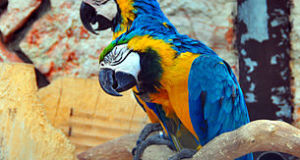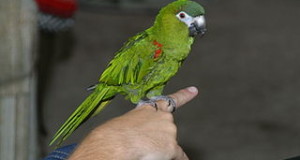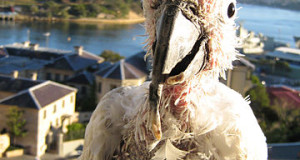Swollen eyes (Periorbital Abscess) are a frequently reported affliction of budgerigars, African gray, various Amazon and nearly all other parrots, but are also seen in canaries and other finches, mynas, toucans, bulbuls and a host of lesser-known pet species. In most cases, a Vitamin A deficiency is at the root of the problem. Less commonly, cysts, trapped foreign objects, trauma and bacterial infection may be implicated.
Initial Symptoms (Periobital Abscess)
Swellings usually develop slowly, beginning as puffy areas in front of and possibly above the eyes, and may be quite subtle. This underlies the importance of knowing your bird well, and of performing a close daily inspection – especially for those who keep smaller birds, or any bird in a large, outdoor aviary. Eventually, the swollen area will spread, encircling the eye and forcing it closed. Treatment may involve surgery and/or Vitamin A injections, followed by dietary changes.
Origin of Vitamin A Deficiencies
Vitamin A deficiencies are typical of parrots fed upon a seed-only diet, and are especially common in species and individuals that tend to feed upon 1-2 types of seed to the exclusion of all others. As always, sunflower seeds are the main culprit. Parrots are notoriously troublesome in this regard, but other groups have their share of offenders as well.
In softbills and other non-seed eaters, this or other deficiencies can arise in birds that feed upon a few favored food items, such as the Pekin robin that takes only mealworms or the toucan that fills up on the bananas in its salad.
Aviary and Group-Housing Concerns
While working in large, mixed-species zoo exhibits, I began to notice that the dominant birds in the exhibit were often the individuals most likely to develop vitamin/mineral deficiencies. While this at first did not make sense, upon reflection I came to realize that it is precisely these birds that arrived at the feeding stations first and filled up on crickets, grubs, blueberries, hard-boiled egg and other favorites.
Left with only prepared softbill diets and pellets upon which to subsist, the subordinate birds actually consumed a more healthful diet than did the exhibit tyrants. Those keeping groups of birds in outdoor aviaries would do well to remain aware of this phenomenon.
Balancing the Diet: Pellets and Prepared Foods
For parrot keepers, the answer lies in switching your birds to a pellet-based diet …a task much easier said than done where many are concerned. Lafeber Nutriberries can be an invaluable ally in your battle. Nutriberries present pellets in a very well-accepted form, mixing in seeds and tasty treats and greatly simplifying the ordeal.
Likewise, pellets can be put to good use in finch diets, and softbill pellets should form the basis of the food taken by toucans, barbets, mynas and similar birds.
Other Steps to Take
Please be sure also to take a look at our extensive selection of bird care books, as there are small details affecting the nutritional health of all species. A high quality vitamin/mineral supplement should also be used as part of a balanced diet for your pets.
Further Reading
For more information on the role of pellets in bird diets, please see my article Avian Nutrition: Pellet-Based Diets.
 That Bird Blog – Bird Care and History for Pet Birds
That Bird Blog – Bird Care and History for Pet Birds




my quails eye is swollen it wont open we have tried everything but nothings working! HELP!
Hello,
Unfortunately this is not something that can be diagnosed at home, as swollen eyes can be caused by a number of different problems..bacterial or fungal infection, forign object, trauma, etc. Please let me know if you need help in locating an avian vet. Best, Frank
Hi frank
My Japanese female quail is swollen and her feathers are puffed up snd shes planting .I picked her up and under hrr feathers her skin in purple on her tummy and she feels hot .still peckin away at seed and walking around .I seperated her from tge male coz he keeps mateing her but there has been no eggs yet ..I don’t know what is going to happen to her maybe shes got a stuck egg ?
Hi Lisa,
With retained eggs you usually see her straining, and swelling is not usually obvious. The symptoms you describe could well be related to an infection of some type, but there’s no way to diagnose at home as many ailments cause similar symptoms. You should have the bird treated by a vet ASAP, as infections tend to spread very quickly. Pl let me know if you need help in locating an avian vet, best, Frank